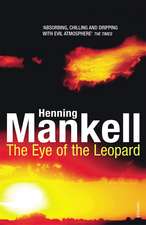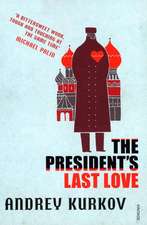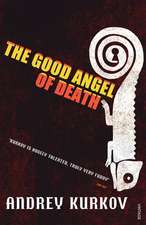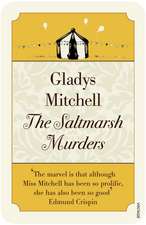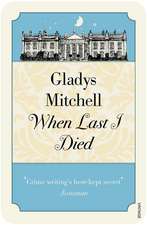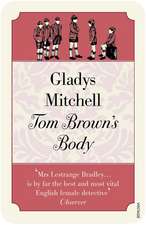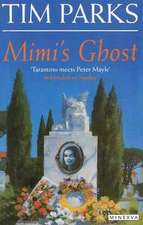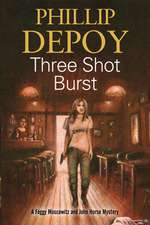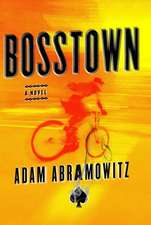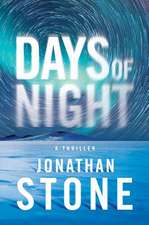The Steel Spring
Autor Per Wahloo Traducere de Sarah Deathen Limba Engleză Paperback – 25 feb 2013
Recovering in a hospital room abroad after a liver transplant, Jensen receives a note instructing him to return home immediately, but when he reaches the airport he discovers that all flights home have been cancelled and all communication from within his homeland has ceased. One of the last messages sent requested urgent medical help from abroad. But what has happen? Has an epidemic taken hold? And why has the government fled the capital? To penetrate the silence and mystery that has fallen over the country and its people, Jensen returns only to discover the unthinkable.
Preț: 75.68 lei
Nou
Puncte Express: 114
Preț estimativ în valută:
14.48€ • 15.78$ • 12.20£
14.48€ • 15.78$ • 12.20£
Carte indisponibilă temporar
Doresc să fiu notificat când acest titlu va fi disponibil:
Se trimite...
Preluare comenzi: 021 569.72.76
Specificații
ISBN-13: 9780307744463
ISBN-10: 0307744469
Pagini: 200
Dimensiuni: 129 x 208 x 16 mm
Greutate: 0.2 kg
Editura: VINTAGE BOOKS
ISBN-10: 0307744469
Pagini: 200
Dimensiuni: 129 x 208 x 16 mm
Greutate: 0.2 kg
Editura: VINTAGE BOOKS
Extras
Chapter 1
Jensen received the letter in the morning post.
He had risen early and packed his suitcase, and when the letterbox rattled he was already in the hall with his hat and overcoat on. He bent down to pick up the letter. As he straightened his back, pain shot through the right side of his diaphragm, as if a high-speed boring tool was rotating in his guts. He was so used to the pain that he scarcely registered it.
He put the letter in his pocket without looking at it, picked up his case, went down to the car and drove to work.
At one minute to nine he turned in through the archway to the Sixteenth District police station and parked in the yellow-painted rectangle marked inspector. He got out, retrieved his case from the boot and scanned the yard. Outside the entrance to the arrest suite there was a white ambulance with red crosses on the doors, which were open at the back. Two young men in white boiler suits, their faces indifferent, were nonchalantly and carelessly shoving in a stretcher. A few metres from them, a police constable in a green uniform was hosing a pool of blood from the tarmac. The woman on the stretcher was young and blonde and had a bloodstained bandage round her neck. Jensen glanced at her and turned to the man with the hose.
‘Dead?’
The police constable pinched the hose to cut off the flow of water and attempted to come to attention.
‘Yes, Inspector.’
Jensen said no more, but turned and went into the reception area, nodded to the policeman behind the wooden counter and walked over to the spiral stairs.
His office on the floor above was stuffy and stale smelling, and the radiator under the window was clanking and hissing. The police station was housed in one of the oldest buildings in a part of the city that otherwise consisted of nothing but steel, glass and concrete. The arrest suite had been extended and rebuilt a few years before, but the rest of the building had never been modernised, and soon the whole lot was to be pulled down to make way for a new bypass. As soon as the new central detoxification unit was ready, the district would be taken out of use. The prospect did not bother Jensen.
He hung up his outdoor things, opened the window a little way and sat down at his desk. He read through the report from the previous night and corrected it minutely in ballpoint pen before putting his signature in the margin. He fished in his inside pocket, took out the letter and looked at it.
Jensen was a man of normal build and ordinary appearance with short grey hair and an impassive expression. He was fifty and had served twenty-nine years in the Sixteenth District.
He was still studying the letter when the door opened and the police doctor came in.
‘You should knock,’ said Jensen.
‘Sorry. I didn’t know you were coming in today.’ Jensen looked at the clock.
‘My replacement doesn’t take over until ten,’ he said. ‘What sort of night has it been?’
‘Normal. We had a sudden death this morning. A woman. The report hasn’t been written yet.’
Jensen nodded.
‘Not in the cell,’ said the doctor. ‘In the yard. She cut her throat as soon as the arrest officer let her out. With a bit of mirror she had in her handbag.’
‘Careless,’ said Jensen.
‘We can’t take everything off them.’
‘Can’t we?’
‘Anyway, she’d already sobered up and had her injection. And the officers who did the body search didn’t think it was glass. Glass pocket mirrors are supposed to be banned.’
‘They’re not banned,’ said Jensen. ‘They don’t make them any more.’
The police doctor was a tall, relatively young man with spiky red hair and angular features. He knew his job and was the best doctor the district had had in the last ten years. Jensen had a lot of time for him.
‘I’m beginning to question the method,’ said the red-haired doctor with a shake of his head.
‘What method?’
‘Blending the alcohol with that muck. The stuff that’s meant to wean them off it. Admittedly the rate of arrests for drinking hasn’t gone up these past two years, but . . .’
Jensen regarded him stonily.
‘But what?’
‘But on the other hand, the suicide rate’s on the up. The depression cases are getting worse.’
‘The statistics contradict what you’re saying.’
‘You know as well as I do how much the official statistics are worth. Take a look at your own confidential reports on accidents and cases of sudden death. Like the woman this morning. We can’t just gloss over it and pretend nothing’s happening.’
He thrust his hands in the pockets of his white coat and looked out of the window.
‘Have you heard the latest? They’re thinking of putting painkillers and fluoride in the drinking water. It’s medical madness.’
‘You ought to watch your tongue.’
‘Quite possibly,’ the doctor said drily.
There was silence in the room. Jensen scrutinised the letter he had received in the morning post. The envelope was white and it had been addressed by a machine. Inside were a white printed card and a steel-blue, gummed stamp with perforated edges and a picture of a bridge spanning a deep ravine, with a single word in the middle: YES. Jensen opened the middle drawer of his desk, took out a wooden ruler and measured the card. The doctor, watching him attentively, said:
‘Why are you measuring it?’
‘I don’t know,’ said Jensen.
He put the ruler back and shut the drawer.
‘Old one, that. Wooden. Steel-edged.’
‘Yes,’ said Jensen. ‘I’ve had it twenty-nine years. Ever since I came here. They don’t make them any more.’
The card measured fourteen centimetres by ten. On the front there was a printed address; on the back there was a series of dashes in a rectangle, to show where the stamp was to go. Above it was some text.
Do you believe in the policies of the Accord? Are you ready to play an active part in the battle against the enemies of the country, inside and outside? Affix the sticker as indicated. Do not forget to add your signature. NB. This card is not to be franked.
Below the rectangle there was a dotted line where the sender was to sign his or her name. Jensen turned the card over and looked at the address.
Central Statistical Office, Ministry of the Interior. Box 1000.
‘Some kind of opinion poll,’ said the doctor with a shrug. ‘Everybody seems to have had one of those cards. Except me.’
Jensen said nothing.
‘Or perhaps some kind of loyalty test. In the run-up to the election.’
‘The election,’ said Jensen.
‘Yes, in a month’s time. If that’s what it is, then it’s pretty bloody superfluous. Waste of state resources.’
Jensen pulled the desk drawer open again and took out a sponge pad of green rubber, marked police property. He felt it with his fingertips. It was dry, and he got to his feet and left the room. Went to the toilet and moistened the sponge under the washbasin tap.
Jensen returned to his office, sat down at his desk, ran the blue sticker over the sponge pad and placed it with pedantic care in the rectangular space. Then he put the card in the metal tray for outgoing post and replaced the sponge in his desk drawer. Closed the drawer. The doctor observed him with a faint smile and said:
‘Your office equipment looks as if it belongs in a museum.’
Then he glanced from the wall clock to the packed suitcase over by the door.
‘Ah well, two hours from now you’ll be on the plane.’
‘Will I die?’ said Inspector Jensen.
The doctor shot him an enquiring look. He paused, and then said:
‘Very probably.’
Jensen received the letter in the morning post.
He had risen early and packed his suitcase, and when the letterbox rattled he was already in the hall with his hat and overcoat on. He bent down to pick up the letter. As he straightened his back, pain shot through the right side of his diaphragm, as if a high-speed boring tool was rotating in his guts. He was so used to the pain that he scarcely registered it.
He put the letter in his pocket without looking at it, picked up his case, went down to the car and drove to work.
At one minute to nine he turned in through the archway to the Sixteenth District police station and parked in the yellow-painted rectangle marked inspector. He got out, retrieved his case from the boot and scanned the yard. Outside the entrance to the arrest suite there was a white ambulance with red crosses on the doors, which were open at the back. Two young men in white boiler suits, their faces indifferent, were nonchalantly and carelessly shoving in a stretcher. A few metres from them, a police constable in a green uniform was hosing a pool of blood from the tarmac. The woman on the stretcher was young and blonde and had a bloodstained bandage round her neck. Jensen glanced at her and turned to the man with the hose.
‘Dead?’
The police constable pinched the hose to cut off the flow of water and attempted to come to attention.
‘Yes, Inspector.’
Jensen said no more, but turned and went into the reception area, nodded to the policeman behind the wooden counter and walked over to the spiral stairs.
His office on the floor above was stuffy and stale smelling, and the radiator under the window was clanking and hissing. The police station was housed in one of the oldest buildings in a part of the city that otherwise consisted of nothing but steel, glass and concrete. The arrest suite had been extended and rebuilt a few years before, but the rest of the building had never been modernised, and soon the whole lot was to be pulled down to make way for a new bypass. As soon as the new central detoxification unit was ready, the district would be taken out of use. The prospect did not bother Jensen.
He hung up his outdoor things, opened the window a little way and sat down at his desk. He read through the report from the previous night and corrected it minutely in ballpoint pen before putting his signature in the margin. He fished in his inside pocket, took out the letter and looked at it.
Jensen was a man of normal build and ordinary appearance with short grey hair and an impassive expression. He was fifty and had served twenty-nine years in the Sixteenth District.
He was still studying the letter when the door opened and the police doctor came in.
‘You should knock,’ said Jensen.
‘Sorry. I didn’t know you were coming in today.’ Jensen looked at the clock.
‘My replacement doesn’t take over until ten,’ he said. ‘What sort of night has it been?’
‘Normal. We had a sudden death this morning. A woman. The report hasn’t been written yet.’
Jensen nodded.
‘Not in the cell,’ said the doctor. ‘In the yard. She cut her throat as soon as the arrest officer let her out. With a bit of mirror she had in her handbag.’
‘Careless,’ said Jensen.
‘We can’t take everything off them.’
‘Can’t we?’
‘Anyway, she’d already sobered up and had her injection. And the officers who did the body search didn’t think it was glass. Glass pocket mirrors are supposed to be banned.’
‘They’re not banned,’ said Jensen. ‘They don’t make them any more.’
The police doctor was a tall, relatively young man with spiky red hair and angular features. He knew his job and was the best doctor the district had had in the last ten years. Jensen had a lot of time for him.
‘I’m beginning to question the method,’ said the red-haired doctor with a shake of his head.
‘What method?’
‘Blending the alcohol with that muck. The stuff that’s meant to wean them off it. Admittedly the rate of arrests for drinking hasn’t gone up these past two years, but . . .’
Jensen regarded him stonily.
‘But what?’
‘But on the other hand, the suicide rate’s on the up. The depression cases are getting worse.’
‘The statistics contradict what you’re saying.’
‘You know as well as I do how much the official statistics are worth. Take a look at your own confidential reports on accidents and cases of sudden death. Like the woman this morning. We can’t just gloss over it and pretend nothing’s happening.’
He thrust his hands in the pockets of his white coat and looked out of the window.
‘Have you heard the latest? They’re thinking of putting painkillers and fluoride in the drinking water. It’s medical madness.’
‘You ought to watch your tongue.’
‘Quite possibly,’ the doctor said drily.
There was silence in the room. Jensen scrutinised the letter he had received in the morning post. The envelope was white and it had been addressed by a machine. Inside were a white printed card and a steel-blue, gummed stamp with perforated edges and a picture of a bridge spanning a deep ravine, with a single word in the middle: YES. Jensen opened the middle drawer of his desk, took out a wooden ruler and measured the card. The doctor, watching him attentively, said:
‘Why are you measuring it?’
‘I don’t know,’ said Jensen.
He put the ruler back and shut the drawer.
‘Old one, that. Wooden. Steel-edged.’
‘Yes,’ said Jensen. ‘I’ve had it twenty-nine years. Ever since I came here. They don’t make them any more.’
The card measured fourteen centimetres by ten. On the front there was a printed address; on the back there was a series of dashes in a rectangle, to show where the stamp was to go. Above it was some text.
Do you believe in the policies of the Accord? Are you ready to play an active part in the battle against the enemies of the country, inside and outside? Affix the sticker as indicated. Do not forget to add your signature. NB. This card is not to be franked.
Below the rectangle there was a dotted line where the sender was to sign his or her name. Jensen turned the card over and looked at the address.
Central Statistical Office, Ministry of the Interior. Box 1000.
‘Some kind of opinion poll,’ said the doctor with a shrug. ‘Everybody seems to have had one of those cards. Except me.’
Jensen said nothing.
‘Or perhaps some kind of loyalty test. In the run-up to the election.’
‘The election,’ said Jensen.
‘Yes, in a month’s time. If that’s what it is, then it’s pretty bloody superfluous. Waste of state resources.’
Jensen pulled the desk drawer open again and took out a sponge pad of green rubber, marked police property. He felt it with his fingertips. It was dry, and he got to his feet and left the room. Went to the toilet and moistened the sponge under the washbasin tap.
Jensen returned to his office, sat down at his desk, ran the blue sticker over the sponge pad and placed it with pedantic care in the rectangular space. Then he put the card in the metal tray for outgoing post and replaced the sponge in his desk drawer. Closed the drawer. The doctor observed him with a faint smile and said:
‘Your office equipment looks as if it belongs in a museum.’
Then he glanced from the wall clock to the packed suitcase over by the door.
‘Ah well, two hours from now you’ll be on the plane.’
‘Will I die?’ said Inspector Jensen.
The doctor shot him an enquiring look. He paused, and then said:
‘Very probably.’
Notă biografică
Born in 1926, Per Wahlöö was a Swedish writer and journalist who, alongside his own novels, collaborated with his wife, Maj Sjöwall, on the bestselling Martin Beck crime series which are credited as inspiring writers as varied as Agatha Christie, Henning Mankell and Jonathan Franzen. In 1971 the fourth novel in the series, The Laughing Policeman, won an Edgar Award from the Mystery Writers of America. Per Wahlöö died in 1975.
Descriere
Descriere de la o altă ediție sau format:
Chief Inspector Jensen is a policeman in an unnamed European country where the government has criminalised being drunk, even in private at home, and where the city centres have been demolished to devote more space to gleaming new roads.
Chief Inspector Jensen is a policeman in an unnamed European country where the government has criminalised being drunk, even in private at home, and where the city centres have been demolished to devote more space to gleaming new roads.

